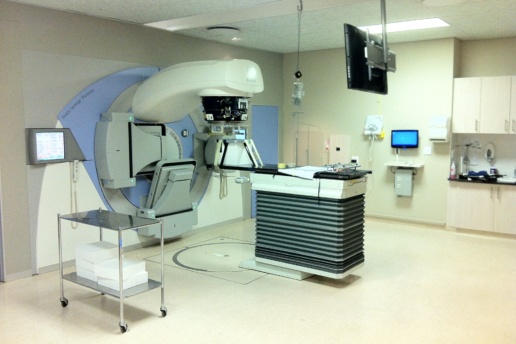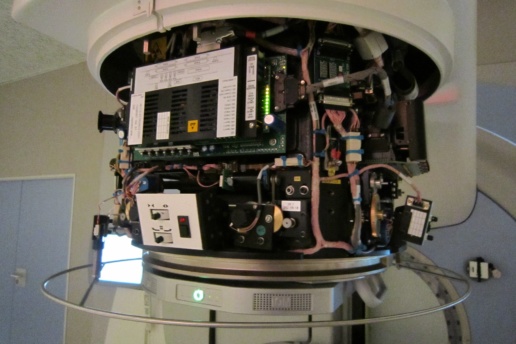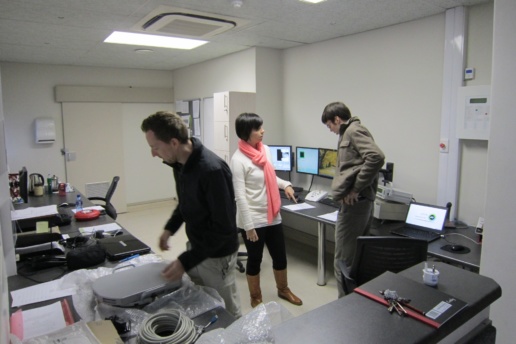University of the Free State, Bloemfontein
The Department of Medical Physics in the Faculty of Health Sciences at the University of the Free State is a well-established, recognized Medical Physics training centre which continues to contribute significantly to the training and education of Medical Physicists in South and Southern Africa. The Department is a regional leader in several areas of Medical Physics research and has established researchers in most of the major disciplines of the field. Main areas of research include Monte Carlo dosimetry simulation, biologically based planning and motion correction in radiotherapy planning, quantitative nuclear medicine and occupational radiation protection. The department collaborates with researchers in Europe and America and is expanding its research activities with the recent appointment of post-doc researchers in radiotherapy physics.
The department is strongly involved in the delivery of clinical services to the academic hospitals in Bloemfontein and it uses these hospitals for the practical training of the interns. This clinical involvement also allows them to make an impact on the diagnosis and treatment of the many patients which pass through their hospitals on a daily basis. Their responsibilities include, but are not limited to, support and development of patient treatments using the Elekta Linear accelerators and high dose rate afterloading equipment that is installed in our hospitals.
Address205 Nelson Mandela Drive, Park West,CityBloemfontain, South AfricaMain ContactFrederik Du PlessisEmailinfo@i-rt.de for detailsPhoneinfo@i-rt.de for detailsWebpagehttp://www.ufs.ac.zaLinac2 (Elekta)TPSElekta Monaco / Elekta XiOInstall. Date2014-07-26IQM tested onElekta Synergy (MLCi2, now Agility collimator)IQM related publications Oluwaseyi M. Oderinde and his colleagues at the University of the Free State in Bloemfontein, South Africa evaluated the sensitivity of the IQM System to errors in beam segments using EGSnrc/BEAMnrc Monte Carlo (MC) codes. The authors show the potential of the IQM System to detect small segment alterations. This article was published in "Computational and Mathematical Methods in Medicine", Vol. 2017 and shows the error sensitivity of the IQM System during online beam monitoring. Oluwaseyi Michael Oderinde and his colleagues at the University of the Free State in Bloemfontein, South Africa developed a new component module (CM) to accurately model the integral quality monitoring (IQM) system to be used in the BEAMnrc Monte Carlo (MC) code. Download this publication in "Radiation Physics and Chemistry", which serves as a basis for researchers that have an interest in MC study of wedge-shaped ionization chamber systems. Oluwaseyi Oderinde from the University of the Free State, South Africa modelled the IQM using the BEAMnrc component module. this model stands as a basis for Monte Carlo study of the IQM system. Download the complete poster that was shown at the SAAPMB conference in Bloemfontein, South Africa.
Sensitivity Analysis of the Integral Quality Monitoring System using Monte Carlo Simulation
A new wedge-shaped ionization chamber component module for BEAMnrc to model the IQM system
Monte Carlo Study of an Integral Quality Monitoring (IQM) System
An intriguing device...
John Wong, Ph.D. Head of Radiation Oncology Physics, Johns Hopkins University, Baltimore, USA
"This allows everyone to stay ahead of the game of QA."
Stanley Benedict, Ph.D. Professor & Vice Chair of Clinical Physics, Department of Radiation Oncology, University of California at Davis Comprehensive Cancer Center, USA
"IQM constitutes a paradigm shift in treatment verification..."
David Jaffray, Ph.D. Head of Radiation Physics Department, Princess Margaret Cancer Centre, Toronto, Canada
"The best idea I have seen in years..."
Uwe Götz, Medical Physicist, St. Vincenz Krankenhaus, Limburg, Germany
"A physics tool for the independent verification of the final beam product."
Robert Heaton, Ph.D. Medical Physicist, University of Toronto, Canada
"Measuring with IQM is a piece of cake..."
Lan Lin Ph.D. Medical Physicist, Johns Hopkins Group, Washington, D.C., USA
"I see endless possibilities..."
Henk Huizenga, Ph.D. Head of Radiation Oncology Physics, Radboud University Nijmegen, The Netherlands
"The IQM System is a highly sensitive dose monitoring device.”
Stefania Pallotta, Department of Experimental and Clinical Biomedical Sciences “Mario Serio”, University of Florence, Florence, Italy
"IQM is an especially good candidate for monitoring small fields due to its unique detector design"
David Hoffman, Ph.D., Medical Physicist, University of California San Diego, USA
"Why didn't anybody think of this before?"
A sentence that we hear during almost every presentation.
"Our study demonstrates clinically negligible changesin beam quality and surface dose for all investigated beams.”
Bozidar Casar, Ph.D., Medical Physicist, Institute of Oncology Ljubljana, Slovenia
"The results of our study demonstrate the clear and consistent correlation of the IQM signal with DVH metrics.”
Livia Marrazzo, Medical Physic Unit, Careggi University Hospital, Florence, Italy
"IQM is a key component of our automated treatment quality control and allows us to fully comply with the requirements defined in the 2013/59/EURATOM directive."
Holger Wirtz, Lake Constance Radiation Oncology Center, Singen-Friedrichshafen, Germany
"The quick setup and fully automated handling of all clinical data significantly reduces the time we need for Plan QA. Our clinical evaluation has shown that the error detection capability of the IQM System is at least as good, and in many cases even better, than with conventional 3D phantoms."
Otto Sauer, Ph.D., Head of Medical Physics, University of Würzburg, Würzburg, Germany


